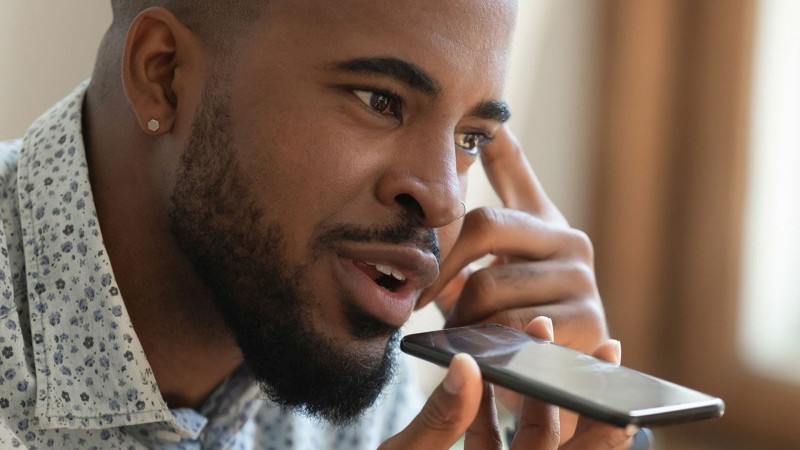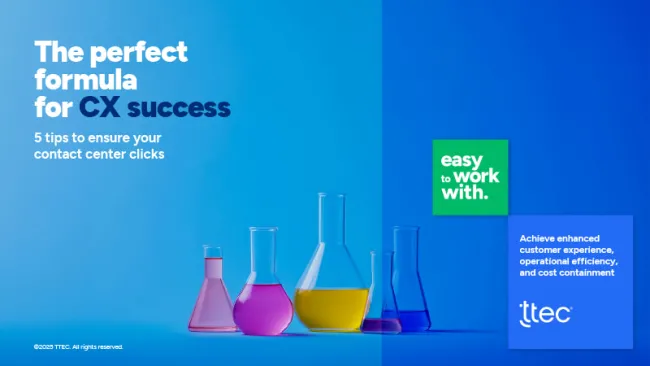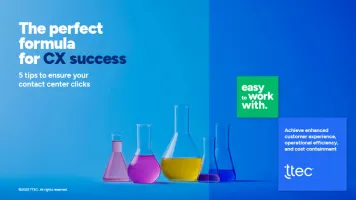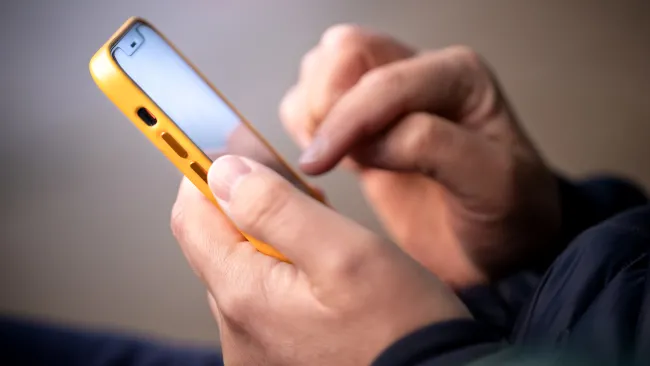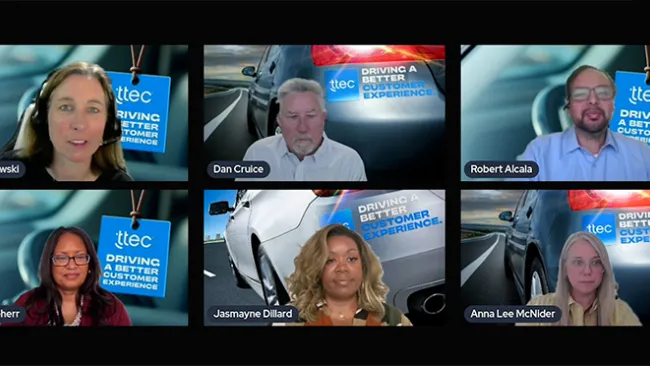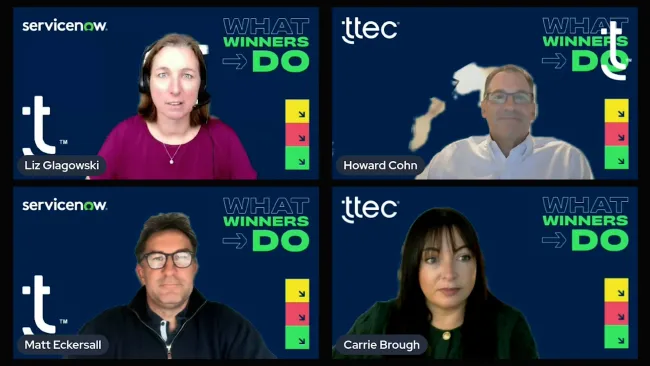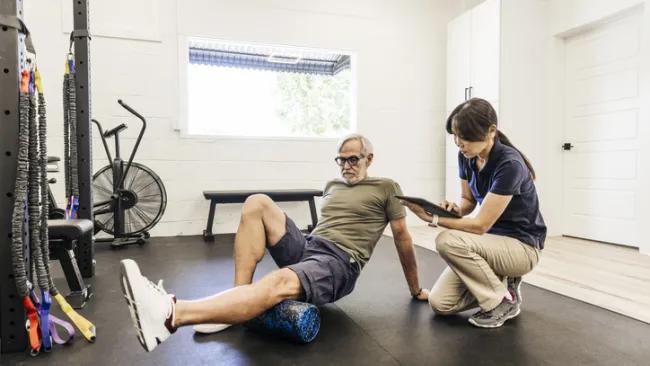Audio apps and social media networks like Clubhouse are taking off for personal and professional development. Liz Glagowski speaks to business strategist Rita Goodroe about the opportunities in Clubhouse and other audio apps to increase customer engagement, drive sales, and provide great experiences.
Key takeaways:
- Clubhouse is an audio-only platform where people can hop in and out of sessions about topics that interest them, like a virtual conference. Users can just listen or join in the discussion.
- There is nothing more powerful than audio and the voice for nurturing relationships and building strong connections.
- Buzz around Cloubhouse is high - people are excited and engaged, so don't be afraid to play around, to be a little creative to break out of the box of what your traditional marketing mechanisms may be.
Transcript:
Liz Glagowski: You're listening to the CX Pod from TTEC and the Customer Strategist Journal. Hi, I'm Liz Glagowski, editor and chief of the Customer Strategist Journal. If you're listening to this podcast, you are a fan of it as an information and entertainment medium. That's great, and thank you very much as a podcast host. The big news is you're not alone. Audio apps are growing by leaps and bounds, fueled in part by people having smart speakers, mobile apps, and frankly, nowhere to go. So the popularity has increased and there are a lot of new social networks and social apps available, including one you've may have heard of called Clubhouse. So today, I'm here with business strategist, Rita Goodroe to talk about the opportunities in audio apps, especially Clubhouse to increase customer engagement, drive sales, and provide great experiences. So welcome to the show Rita.
Rita Goodroe: Thank you. I'm excited to be here. Thanks for having me.
Liz Glagowski: So Rita, you're an author and a business strategist with a focus on entrepreneurship, particularly women led entrepreneurship. So can you talk a little bit about that and then what attracted you to this topic for both yourself and your clients?
Rita Goodroe: Yeah, my story is as every entrepreneur, right? Not a straight line. So I was a business attorney for, I don't know, about 13 years and I ran a singles group as a hobby in the DC area while I was an attorney and that ended up, this crazy story for another day. I went on 35 dates in 35 days, I blogged all about it. The blog became really popular and long story short, I ended up leaving my life as a lawyer to become a dating coach. And I built that business pretty quickly, mainly because I had been running a singles group in the DC area for five years. And so, I built this successful date coaching business, and people started asking me how I had done it. They were like, "Rita, how did you get clients? How did you get customers? How did you build this business relatively quickly and it seemed so easy?"
And I started mentoring women on how to grow their business around visibility and sales and marketing and I loved it. And after about a year of being a full-time date coach, I ended up going full-time business strategist and sales coach, which is what I've been doing now for, gosh, almost seven years. So, I do, I work with women entrepreneurs at a variety of levels around their visibility, their marketing, their sales skills or mindset, right? Really, I say women come to me with different mindset, visibility and sales challenges, and I help them overcome those challenges so that they can create profit in their business in a way that feels really good.
And so, obviously any visibility tool is one that my clients are always hungry to hear about and they want know, should I be on it? Should I do it? What should I do? And so, when Clubhouse came along, which I know we're going to talk about today, that is definitely something that I am just talking all about because it is a great way of building relationships and visibility. But that's how I got interested in the topic overall of audio relationships, connections, visibility platforms, and tools. And I really think there's nothing more powerful than audio and the voice for nurturing relationships and building some strong connections.
Liz Glagowski: Great. So let's start right at the beginning. For people who may not be aware or may have just heard about it, what is Clubhouse and why should people be interested in it even from a business perspective?
Rita Goodroe: Yeah, Clubhouse is interesting. So Clubhouse is an audio only platform where people can hop in and out. Now, people are like, "Why am I interested in that?" So I'm going to explain it in the Rita way, which is, think of Clubhouse like a conference. It's an audio only conference. So if you went to a real conference, there's a hallway and off the hallway are lots of doors, let's say, and the doors lead to keynotes, breakout sessions, social events, workshops, all kinds of things, right? Because you're at this big conference, but everything down this hallway is something that you love. It's been custom curated. This hallway has been custom curated by some hallway algorithm just for you and everything that's behind all of the doors is something you're going to love.
Now, when you go behind a door, you can either sit in the audience and listen, or if you feel inclined and it allows for it, you can raise your hand and interact and participate. Or you could even be the one that created the room and be up on the stage leading everything. And so, whether that's for social or business or a variety of things between, that's what Clubhouse is. And when you think of it that way, the reason you care is because it becomes one of the easiest ways to do almost everything you need to do to grow a sustainable and strong business in one platform, in one way and you can make connections globally because this is basically a global app.
And so, then people are like, "Oh, okay, I'm interested. Tell me more," right? And I say, "Okay, so it's marketing, yes. But really it's a relationship building platform. And that's why you should care because you can connect with people who you would never, it's not that you would never be able to connect with them, but it may take a really long time, a lot of ingenuity, a lot of finagling to make the connections that you can make on Clubhouse because of the nature of the platform and what's happening there." So that's the best way that I explain it. Hopefully that made sense in your mind.
Liz Glagowski: Oh, absolutely, absolutely. I like the analogy to a conference without the happy hour, unless you bring your own, I guess.
Rita Goodroe: Yeah, that's it. So it's funny you say that. There is a room in Clubhouse called The Speakeasy and you go in and people change their profile photos to the drink that they're drinking, there's a musician playing and you hear music and everybody's just talking and chatting about topics they would if they were sitting around a table together at a bar for happy hour. So yes, even that.
Liz Glagowski: As businesses while there's a lot of obviously opportunity to learn about this personally, but from a business context, what are then some of the customer experience potential of Clubhouse? How do you see brands using it? How do you maybe use it yourself? What do you see from a business perspective of how it's being used?
Rita Goodroe: Yeah, I mean, I personally think that one of the most powerful things that can come out of Clubhouse is market research. I mean, Clubhouse has attracted ... And this is with it only still being open to iPhone, right? It opens to Android, I think, in a couple of weeks. They say a week or two, it's supposed to open to everybody. And so, even with only iPhone users, which is a huge portion of the world, let's be honest. You can come across everyone with every interest from every demographic, every thing. You can land on conversations that they're having. You can know from the titles of the discussions to what they're talking about and how they're talking about it, what clubs they're creating, what the discussions of the clubs are.
What your customers, your target market, your clients, what is important to them? What are they thinking about? Where is their attention? How are they talking? I mean, market research is incredible. So whether you're just listening or you're coming in and leading your own rooms and discussions to almost like a focus group to get to know your target market better. I think Clubhouse is incredible for some of the most powerful market research and data that you can compile and you're building relationships with the people while you're doing it, right? That's one thing. Another is it's just a great tool to build a real community around your business. I know companies that have their community managers coming in and leading a variety of discussions that their customers and clients would be interested in.
And so, people are being attracted to that platform to come interact with some of their favorite brands. But then, of course, those conversations are open if you set them so to everybody on the platform. So now people are coming in and listening and learning as well. So they're hearing from people that already like and love what you do and now they're interested and they want to talk more. And then the best use of Clubhouse, I think, was there was a woman who owned Cinnabon and she came in and she gave everybody who wanted free Cinnabon for two weeks. For two weeks, she just took names and addresses and sent people Cinnabuns and all of Clubhouse was buzzing about Cinnabons for weeks because everybody was eating them.
And it was just great brand awareness. It was just a great way to get her product and get people talking about her company. So from sponsoring rooms to doing market research to interacting with clients and customers to connecting with influencers, even, and having influencers help through the discussions. I mean, volunteer things. Pedigree did a dog adoption on an audio only platform. I mean, it's quite incredible what you can do, and that's why companies really need to be paying attention to it.
Liz Glagowski: Wow. That's great. I think Cinnabon would is a great example because people aren't wandering around maybe a mall or somewhere else that are going to have Cinnabon, but you get that smell. You get that great taste, everyone loves it. So it sounds great to have an example like that, to be able to use it. So now can you talk about how in-depth some of these rooms are? I mean, are they going into really specific topics or are they more general? Just how would a brand think about maybe trying to go into it and with what topics?
Rita Goodroe: Yeah, this is the exciting part of Clubhouse is they're really what they call creator focused. Meaning, the creator of the discussion, the creator of the room has total control for it to be whatever you want it to be. And you'll find that there's everything from, okay, so there was a one hour interview with the CEO of 1-800-Flowers yesterday, not yesterday, it was a little bit ago, not long ago by a club on Clubhouse called the Likable Business Club. And they bring in people every Sunday night for an interview. And so, the CEO of 1-800-Flowers that was an hour of just not only hearing a little bit of an interview, but then you got to come up and ask questions, right? You got to raise your hand, you got to ask a question, he answered your question.
You're creating that connection and relationship, but they're also 15 minute ask us anything rooms. There are one hour Q & A's or even just let's get a round table discussion going around how are you staying healthy during a time of lockdown or everything you can think of, you can create it. So you really have to ask yourself, "What would be the purpose of why we're coming into Clubhouse to use it? What are the outcomes we want?" And then reverse engineer it to come up with a container, the discussion, the room that you think would actually help lead to those. So you really do have to almost come at it from the end in mind, know your goals, know why you're using the platform and know what you want to get out of it so that we can then pinpoint the right ways to use it, the right conversations and the right people to put in place to lead those, so that you're having that experience at the end of everything.
Liz Glagowski: Yeah. Those are some great tips to get a little bit tactical into how to actually go about it. So what other advice might you have for companies looking to get in there? Because you don't want to just be using it maybe poorly and therefore, not seeing results of it or making it worse than if you were not. I know with some other social media, if you're not answering your Twitter, it's worse than if you didn't have Twitter at all. Do you have advice for what brands may want to do and then maybe some pitfalls to avoid as they start to use it?
Rita Goodroe: Yeah. I would say that for companies, they're really going to have to realize that this isn't going to have the same analytics yet or data as some of your other endeavors. Also, don't look at it as the way to make quick turnaround sales. This is a longer, I don't want to call it a game, but it's a longer term strategy in terms of showing up. And when you look at it more as a relationship building platform and not so much a marketing platform, than what you might expect of it and how you're going to use it will change. So I know companies, a lot of bigger companies especially, can be hesitant to come in, put time and energy into a platform that's still relatively new that could still go away. But I would say that right now is the time to do it.
Right now is the time when the buzz is the highest, people are excited, people are engaged, so don't be afraid to play around, to be a little creative to break out of the box of what your traditional marketing mechanisms may be. Understand that it is a great way to build brand advocacy and loyalty, and really create a relationship with your clients and customers. And when you look at it like that, you can see the power will far exceed what even a regular marketing effort might. If you can really engage and create brand advocates, people who are going to want to go out and market for you because they have that experience with you on Clubhouse, everything changes. So software platforms and magazines and all, they're coming in with their editors and with their whole team and there's an app called Community that helps you stay in touch with, it's like an email list, but by text, right?
On your phone, but in a more powerful way. That whole team shows up on Clubhouse talking about how can you create community around your business? Bigger, broader topics, and guess what? Everybody wants to now sign up for Community. They all want to use that app, right? But people are not saying, "I got to meet with the president, or I got to meet with the whatever," and the customer experience has been so great, now they're advocating for this company, even when the company's not on the platform. So really looking at it like that, I think, can take away some of the fear about why you might want to avoid the platform, because I think from a marketing point of view, if you were to give it to a marketing team, there are a lot of unknown variables that make it a little scary to really put time and energy into Clubhouse as a marketing tool, but change your perspective on it. That would be my main piece of advice.
Liz Glagowski: Yeah, so consider it as a relationship building tool, not a hard sales marketing tool?
Rita Goodroe: Exactly. It's not like Facebook ads. You're not going to get an immediate, downloadable, what was the return on our investment, right? And the return on the investment may feel if you're looking at it from that perspective, like a lower return than other options. And so, you'll avoid it going, "Well, this isn't a great way for us to mark." But if you rephrase it and flip the perspective to be, but how powerful is this as a relationship building tool and what are the different types of relationships, you might have a different way that you're measuring the success on the platform.
Liz Glagowski: I think brands are ready for it, because if you think about the last year, we've had to knock down the barriers between personal and professional lives, right? We've got our Zoom meetings happening in our kitchen and our kids and our pets are running in and out. And we had to do everything from our homes and being a little bit more personable, personal, just letting people's personalities show through has extended into some brand outreach. So I think that may fuel some of the excitement around this, because it seems like this is a platform to be able to be real and authentic in that relationship building. What do you think about that?
Rita Goodroe: In fact, it wouldn't work if you're not being real and authentic. I think you're going to set yourself up for a lot of failure if you're not coming out this ... And it's really interesting. You'll appreciate this story. There was a, I won't say who she is because it was a very closed conversation, but there was a top CEO in this room of, I don't know, 100 people or something. We were all talking. And I mean, she really opened up a lot about a lot of just her journey and gave some really great mentorship advice but in this really deep, authentic, personal way. And I asked her, I said, "Would you tell me that if you just saw me over lunch one day?" She's like, "No, probably not."
And I said, "Well, tell me why you were so willing?" And she said, "I'll tell you what. I'm sitting here on my couch, in my robe having just come out of the shower with a towel wrapped around my wet hair, drinking a glass of wine and it feels like I'm just chatting with a girlfriend. This is the way I would be if I was chatting with one of my best friends. This is the way that it would be. And I think because of that, I immediately feel more connected to the people who I'm engaged with." So you put the casualness of the environments that people are in when they're having these conversations and then you combine it with the fact that you can't outsource this, right? It has to be Rita talking on the platform. It can't be anybody else, but Rita being Rita on the platform.
And because it's audio, you can't watch it, you have to listen. You can't miss it, right? It's not recorded. So there's a fear of missing out. But also, you have to be present. You have to pay attention. So being present, knowing that you have, people's basically full attention for the most part and that you're in these casual environments, but having these deep conversations and just the power of the voice to make you feel like you know someone will create these more connected moments on a quicker, deeper level than they would in other environments.
Liz Glagowski: Yeah, that's a great point. And I'm curious to see, obviously this is taking off and a lot of interest, because I think earlier this week, or very recently, Facebook announced that they were going to try to launch something similar with some audio options within the Facebook platform. And then even I think Apple is adding some enhancements to some of its audio apps and programs. So why do you think some of the big companies and some of the social media top dogs are trying to advance audio as well. It's not just this little niche Clubhouse that's doing it.
Rita Goodroe: Yeah. Well, I mean, podcasts have been around for a while, and audio books. And so, audio has always been there, but I think the pandemic, I think COVID-19 is really what allowed Clubhouse to boom, to foster. Suddenly, people didn't have a way to come together and to connect. And so, Clubhouse became that way. People were having birthday parties and celebrations and all kinds of things. It was a way you could log on, find people, feel connection and create really what we've been seeing, these powerful relationships. And so, even now that the world is starting to slowly reopen, I think companies have realized, wait a minute, there was something here and also, we need to be prepared for pivots and turns. And this is a way that we could either use this as a supplement to.
So big events are like, hey, this is a great supplement. This is a great way to connect, let's say, attendees of a conference before everybody gets to the conference that cuts through posts and texts. Who has time to read more content, right? But if people want to get to know who's coming to the conference, you log onto our rooms on an audio only app, wherever that is, Facebook, Clubhouse, anywhere, you're going to connect and the excitement for the event will now be higher when people get to the event in a deeper way post-event. It's a great way to keep the conversations going post-event. So suddenly, people are finding all of these ways to supplement their businesses and what they're doing, and they notice how easy it is and how open people are to using it because it removes so many obstacles. You don't have to have the right lighting, your background doesn't have to be perfect.
You don't have to be in a good environment. You don't have to be glued to your desk. You don't have to be looking at a camera. You don't even have to be dressed. You don't have to wear makeup, right? We have no idea what's going on on the other end of the phone sometimes but that makes the barrier to participating really low. Meaning, more people will participate. And so, when you really think about it like that, you're like, "Oh my gosh, this is one of the easiest ways for people to participate. We want to have something to do with that."
And I think that's why. I think people know always the power of voice. I mean, there've been studies, scientific studies done on the power of voice and how it motivates, inspires, how it influences, how it connects, right? But now you add to it, the low cost of entry almost, or the low barriers to allowing people to participate. And it starts evening the playing field to reach a wider, broader, more diverse global audience in a really easy, low cost and efficient way. So I think that that's just something worth exploring and looking into.
Liz Glagowski: Yeah, we write a lot about the goal of creating what we call effortless experiences. And I think this is a platform to be able to do that in a two way interactive way, rather than broadcasting things to someone or adding, you were saying, these barriers, even if it's just what your Zoom background looks or whatever.
Rita Goodroe: Exactly.
Liz Glagowski: So great point. So if someone's listening to this hopefully, and is interested in trying to get on Clubhouse as a brand and trying to help their business, what are some first steps that you would recommend people do?
Rita Goodroe: Yeah. I mean, I think obviously, go and set up your account right now. You still need an invite, or you can just email Clubhouse, I think they'll help you get on at this point. But you set up your account and then I would say, listen. Go into a few rooms, listen, learn how to use the search. Search for keywords to find people and clubs that are talking about the topics you want to hear about, who are the people you want to be interacting with. So they have a really robust, really great search feature where you can keyword search and find people and clubs that have collected the kinds of people who are having the conversations and who would be the people you want to interact with.
So once you find them follow a few of them, and then all of a sudden who you followed determines what you see in your hallway, right? So you're going to start seeing these conversations that these people are going into or these clubs are having in your hallway. And once you do that, go into some of them, sit and listen, and you're going to get to know the different styles and the different ways people are using Clubhouse. And then, click on some people who you want to connect with and get to know and start following them into their conversations, and then participate. The more you raise your hand and participate now, the more people are going to interact with you. Now if you're a larger company or you have a little more status, and I don't say that in a negative way.
But you could probably reach out to somebody, like again, Pedigree reached out to a top influencer in the mental health space and said, "Hey, you know what? We think this is a great way to get some of these dogs adopted during COVID. And so, they set it up with Clubhouse where every dog had their own profile on Clubhouse with their photo and a little bio about them and they were all in one room together. And the whole point was how pets can improve your mental health. So they partnered with a mental health club and a top mental health influencer, it's the largest club on Clubhouse with 50,000 people and this club hosted a dog adoption event on this Clubhouse platform and so many dogs got visible, Pedigree got visible, dogs got adopted, a very important conversation was had, right?
So think about who you might want to collaborate with in those ways and find them first on the Clubhouse space and then reach out to them outside of Clubhouse and say, "I would love to partner with you." So big brands and companies, you don't have to be big even, but brands and companies, if you're thinking about the bigger way you'd like to show up, the bigger community initiatives and all, find the people who would be the right people to host those conversations who already have an established following and then see how you can partner together. Much Likable Business bringing in top CEOs and interviewing them. Think about how can we partner, who do we need to partner with? Those would be some of my first tips.
Liz Glagowski: Great. Thank you. So just to sum up, we really talked about the idea of using Clubhouse and other audio platforms as a way to create real, authentic and effortless, more simplified relationships with people and then with brands as well. So, thank you so much Rita for joining us. So obviously, I'm going to assume that you're on Clubhouse. So if anybody wants to join Clubhouse and maybe follow you and connect with you, can they do that on Clubhouse and maybe elsewhere? If somebody wants to talk to you more, where can they find you?
Rita Goodroe: Oh, absolutely. I am on Clubhouse. I'm at RitaGoodroe on Clubhouse. I'm also at RitaGoodroe on Instagram. And in my Instagram bio, you'll actually find a Clubhouse guide that helps you go through Clubhouse, so that's a free guide that people can download. So I think Instagram at RitaGoodroe, you can go to ritamademedoit.com, which is my website. So ritamademedoit.com, at RitaGoodroe on Instagram, at RitaGoodroe on Facebook, at RitaGoodroe on Clubhouse. And that's G-O-O-D-R-O-E R-I-T-A G-O-O-D-R-O-E. You can find me there. Reach out to me though, that's the important part. Send me a message. Tell me where you heard me and we'll connect. We'll talk. I would love to help you leverage Clubhouse or any other platform, or just learn more about your business. I can never make enough connections or learn enough, so I would love to connect.
Liz Glagowski: Great. Well, thank you so much for enlightening me on the benefits of Clubhouse and audio social media, and I look forward to seeing you on those platforms. So thanks again.
Rita Goodroe: Thank you.
Liz Glagowski: To learn more about bringing humanity to business, come see us at ttech.com or subscribe to our journal at customerstrategistjournal.com. Thanks. See you next time.
